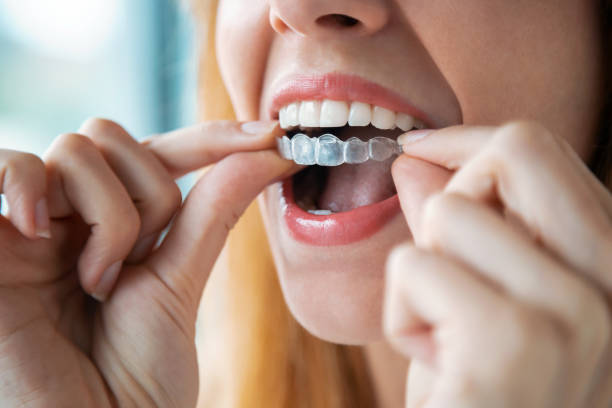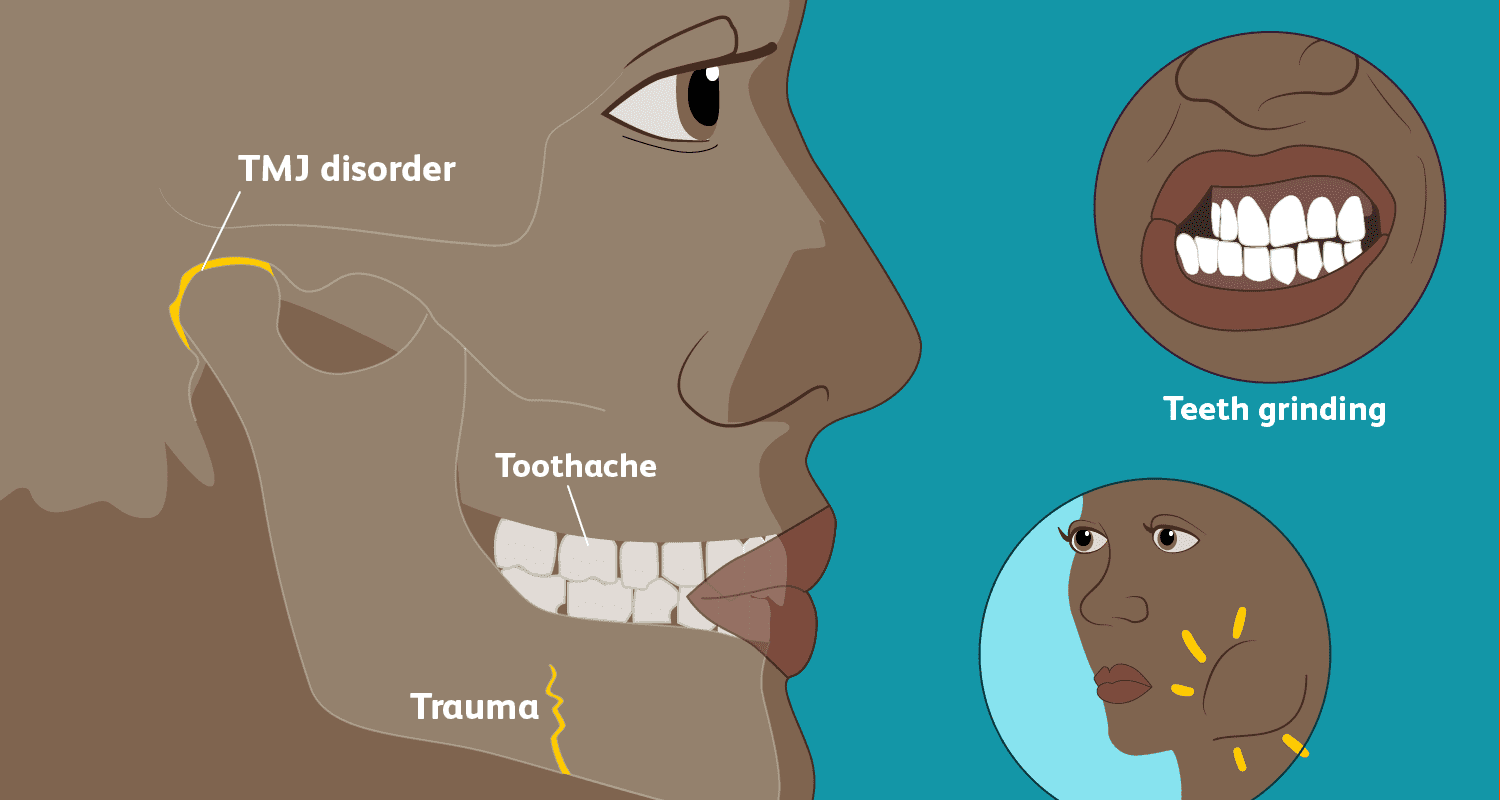Welcome to Royal Dental Clinics, where your smile and oral health are our top priorities. In this blog, we will explore an effective solution for patients suffering from temporomandibular joint (TMJ) disorders: the dental night guard. TMJ disorders can cause a range of uncomfortable symptoms, such as jaw pain, headaches, and teeth grinding. As an experienced dentist at Royal Dental Clinics, Dr. Chirag Chamria understands the impact TMJ disorders can have on your daily life. Join us as we dive into the world of dental night guards and discover how they can bring relief and protect your precious smile.
Understanding TMJ Disorders and Symptoms
TMJ issues impact jaw joints and muscles. Stress, jaw misalignment, bruxism, and arthritis may cause these diseases. Understanding Temporomandibular Joint (TMJ) symptoms helps recognize and treat them early. Common symptoms:
Jaw Pain and Stiffness: TMJ disorders often manifest as persistent jaw pain, which may be localized to one side or affect both sides of the face. The pain can range from mild discomfort to severe, debilitating pain. In addition, you may experience stiffness in the jaw muscles, making it challenging to open or close your mouth fully.
Clicking or Popping Sounds: Another telltale sign of TMJ disorders is the presence of clicking, popping, or grating sounds when you open or close your mouth. These sounds occur due to the displacement of the disc within the joint or irregularities in the joint’s structure.

Headaches and Earaches: TMJ disorders can cause referred pain, leading to frequent headaches or earaches. The pain may be localized around the temples, behind the eyes, or radiate to the neck and shoulders.
Difficulty in Jaw Movement: Some individuals with TMJ disorders may find it challenging to open their mouths wide or experience a sensation of the jaw locking or getting stuck in a certain position. This limitation in jaw movement can affect everyday activities such as eating, speaking, or yawning.
Teeth Sensitivity and Pain: TMJ disorders can lead to dental symptoms such as tooth sensitivity, toothaches, or pain while biting or chewing. This occurs because of the strain placed on the teeth and surrounding structures due to jaw misalignment or tooth grinding.
Facial Muscle Fatigue: TMJ disorders can cause the facial muscles to become fatigued or overworked, leading to muscle tenderness or aching sensations around the face.
Role of Dental Night Guard in TMJ Disorder Treatment
When it comes to finding relief from TMJ disorders, dental night guards have emerged as a highly effective and non-invasive treatment option. These custom-made oral appliances play a significant role in alleviating the symptoms associated with TMJ disorders. Let’s explore the various ways dental night guards can benefit you:
Reducing Teeth Grinding (Bruxism)
Many individuals with TMJ disorders also suffer from bruxism, a condition characterized by the grinding or clenching of teeth, often during sleep. Dental night guards create a protective barrier between the upper and lower teeth, preventing direct contact and reducing the force exerted during grinding. By cushioning the impact, night guards help prevent tooth damage, enamel erosion, and the potential for jaw muscle strain.
Relieving Jaw Tension
TMJ disorders can lead to muscle tension and discomfort in the jaw. Dental night guards help relax the jaw muscles by providing a stable and comfortable resting position. The guard helps to distribute the forces evenly throughout the jaw, minimizing muscle strain and reducing pain and tension.
Minimizing Jaw Joint Stress
The temporomandibular joint (TMJ) is a complex joint that connects the jawbone to the skull. In TMJ disorders, the joint can experience excessive stress and pressure, leading to inflammation and discomfort. Dental night guards help by positioning the jaw in a more balanced and neutral position, reducing stress on the TMJ, and promoting its healing and proper functioning.
Preventing Tooth Wear
Bruxism, a common symptom of TMJ disorders, can cause significant tooth wear over time. The grinding and clenching action can lead to flattened or chipped teeth, enamel erosion, and even tooth fractures. Dental night guards act as a protective barrier, absorbing the forces generated during grinding and protecting the tooth surfaces from excessive wear.
Alleviating Headaches and Facial Pain
TMJ disorders often contribute to headaches, facial pain, and even earaches. By providing support and aligning the jaws properly, dental night guards can help alleviate these symptoms. The reduction in jaw muscle tension and stress on the TMJ can have a positive impact on headache frequency and intensity.
Importance of Custom-Made Dental Night Guard
Custom-made dental night guards are of paramount importance in TMJ disorder treatment. Unlike generic, one-size-fits-all options, custom night guards are specifically tailored to fit your unique dental structure. This precise fit ensures optimal comfort, effectiveness, and long-term durability.
By choosing a custom-made night guard, provided by Dr. Chirag Chamria at Royal Dental Clinics, you can expect a personalized design that addresses your specific TMJ disorder concerns. With the guidance of a dental professional and the use of high-quality materials, a custom night guard offers superior protection, relief, and a comfortable night’s sleep. Invest in a custom-made dental night guard to safeguard your smile and experience the benefits of a tailored solution for your TMJ disorder.
Process of Getting a Dental Night Guard
Obtaining a dental night guard for your Temporomandibular Joint (TMJ) disorder involves a straightforward and efficient process. Dr. Chamria and the team at Royal Dental Clinics are committed to ensuring your comfort and providing you with a custom-made night guard that fits your specific needs. Here’s an overview of the process:
Consultation and Evaluation: Your journey begins with a consultation with Dr. Chamria, during which he will evaluate your TMJ disorder and discuss your symptoms and concerns. He will examine your jaw alignment, assess the extent of tooth grinding, and take any necessary X-rays or scans to gather comprehensive information about your condition.

Customized Treatment Plan: Based on the evaluation, Dr. Chamria will develop a customized treatment plan tailored to your specific needs. This plan may include recommendations for a dental night guard as part of your Temporomandibular Joint (TMJ) disorder treatment.
Impression and Customization: To create a custom night guard, impressions of your teeth will be taken. This involves placing a soft material in a tray and having you bite into it to capture the exact shape and alignment of your teeth. These impressions serve as the foundation for fabricating your custom night guard, ensuring a precise fit and optimal comfort.

Fitting and Adjustments: You’ll visit Royal Dental Clinics to install your dental night guard. Dr. Chamria will modify the night guard to suit your mouth and improve its efficacy and comfort. He may also explain how to insert, remove, and maintain your night guard.
Education and Follow-up: Dr. Chamria will instruct you on dental night guard use and care during the fitting. He will explain how to clean, store, and wear it for optimal benefit. He may also arrange follow-ups to assess your progress and adjust the night guard.
Caring for Your Dental Night Guard
Cleanliness: Rinse your nightguard before and after use. Hot water distorts appliances. Clean your nightguard with non-abrasive toothpaste or soap. Use a gentle toothbrush to clean the nightguard.
Storage: When not in use, keep your dental night guard in its protective case. This will prevent dust, bacteria, and damage. Avoid placing the night guard in a location where it can be easily lost or damaged.
Don’t chew or Bite: Dental night guards are designed to provide protection and alleviate symptoms of TMJ disorders. Avoid using the night guard as a chewing or biting device, as this can cause premature wear and compromise its effectiveness.
Regular Check-ups: Schedule regular follow-up visits with Dr. Chamria to ensure your night guard is functioning correctly and to address any concerns or adjustments needed. He will assess the condition of the night guard, make any necessary modifications, and monitor the progress of your TMJ disorder treatment.
Replacement: Over time, dental night guards may experience wear and tear. They may lose their shape or become less effective in providing the necessary support and protection. Depending on the material and usage, night guards may require replacement every 1-3 years. During your follow-up visits, Dr. Chamria will evaluate the condition of your night guard and advise you on when it’s time for a replacement.
Conclusion
Suffering from Temporomandibular Joint(TMJ) disorders can significantly impact your quality of life, but with the help of a dental night guard, you can find relief and protect your smile. Dr. Chirag Chamria and the team at Royal Dental Clinics are committed to providing personalized care and effective solutions for TMJ disorders. If you’re experiencing symptoms or seeking preventative measures, don’t hesitate to reach out to Dr. Chamria. Say goodbye to jaw pain, sleepless nights, and hello to a healthier, happier smile. Your journey to a pain-free life starts here.
© All rights reserved by Royal Dental Implants Pvt Ltd
Issued in public interest






